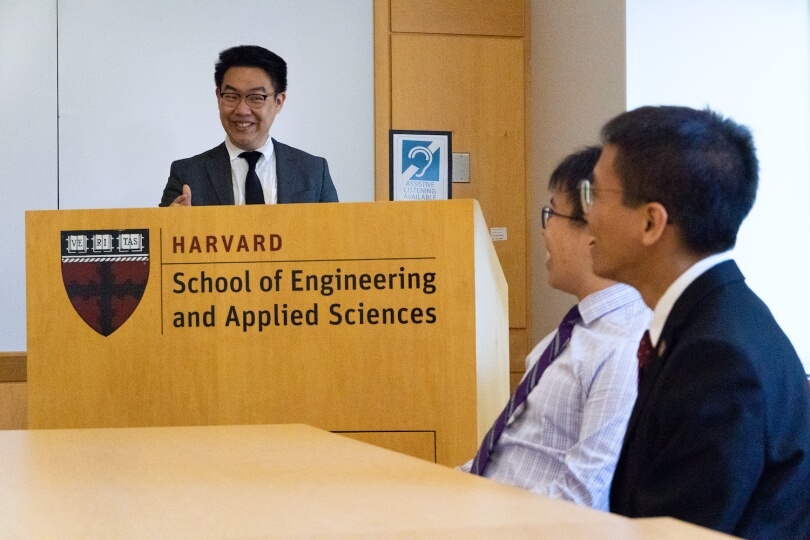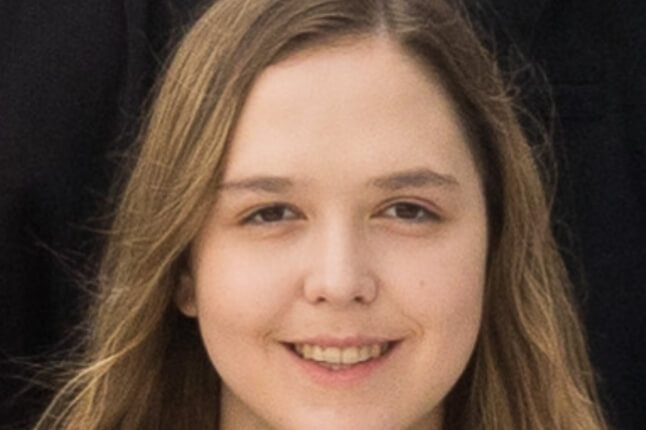News
Harrison Ngue, A.B. '23, presents his senior thesis on chemotherapy-resistant cancer cells. (Pei Chao Zhuo)
Chemotherapy can be a highly effective treatment for cancer. But if it doesn’t eradicate all cancerous cells, those that remain go into a dormant phase known as quiescence, in which the cells stop dividing and spreading, but are still present in the body. The cancerous cells can later wake up, and when the cancer returns, the new tumors tend to resist chemotherapy.
Harrison Ngue, a recent graduate of the Harvard John A. Paulson School of Engineering and Applied Sciences (SEAS), examined chemotherapy resistance in cases of cancer relapse for his senior thesis in biomedical engineering. He worked with research advisor Shobha Vasudevan, Associate Professor of Medicine at Harvard Medical School and Assistant in Genetics at Massachusetts General Hospital, as well as undergraduate concentration advisor Linsey Moyer, Associate Director of Undergraduate Studies in Biomedical Engineering. His work received multiple awards, including the Bowdoin Prize for Undergraduate Essay in the Natural Sciences from the Harvard Faculty of Arts & Sciences, which recognizes essays of “originality and high literary merit.”
“I found out about the Bowdoin Prize from my advisor at SEAS, Linsey Moyer,” Ngue said. “It’s a super competitive prize: only two students out of the entire college are selected. I can't express enough how grateful I am for the incredible environment, students, and faculty at SEAS. Throughout college, I've been surrounded by an amazing community that has supported me every step of the way. The inspiring atmosphere here makes me feel like anything is possible.”
To qualify for the prize, Ngue had to condense his 75-page senior thesis into a 30-page essay. His writing style also had to change, focusing more on his personal experience watching his mother undergo chemotherapy for breast cancer, and using language less reliant on technical vocabulary and more comprehensible for a general audience. His research also won a Thomas Temple Hoopes Prize for excellent undergraduate work and excellence in the art of teaching, and took second place in the Three Minute Thesis competition. With each award, Ngue had to present his thesis in a new form to a different audience.
“Translating my thesis to a non-scientific audience challenged me, but I think it's super important and I'm really glad I did,” Ngue said. “We have a vast amount of information about how cancer works, but a lot of this information remains inaccessible to the general public.”
To help translate his thesis to a general audience, Ngue drew on his experiences as an educational science animator on YouTube. He published his first video, based on a problem set he encountered in a life sciences class, as a freshman in 2020, and has since produced several more videos on topics such as DNA structure, gene editing and cellular biology.
“Teaching and science communication are really important to me,” Ngue said. “I originally entered the competition just to have a platform to sharpen my science journalism skills and share my research, and I'm incredibly grateful that the committee saw value in my story.”
Ngue hopes to use those same skills when he enrolls at Harvard Medical School this fall.
“As a doctor, I won’t just be talking with other specialists,” he said. “I’ll be communicating with patients, family members, people who won’t necessarily have a scientific background. I embrace being a lifelong learner and lifelong educator.”
Topics: Academics, Alumni, Awards, Bioengineering, Health / Medicine
Cutting-edge science delivered direct to your inbox.
Join the Harvard SEAS mailing list.
Press Contact
Matt Goisman | mgoisman@g.harvard.edu



